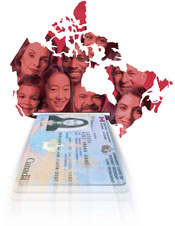Calgary, June 28, 2012 — Citizenship, Immigration and Multiculturalism Minister Jason Kenney today announced the latest step in re-designing Canada’s economic immigration system.
Effective July 1st, 2012, Citizenship and Immigration Canada will place a temporary pause on new applications to the Federal Skilled Worker Program (FSWP) and federal Immigrant Investor Program (IIP).
 “We have been making lots of changes to our economic immigration system,” said Minister Kenney. “We will take the next six months to do a lot of the heavy lifting to get us closer to a fast and flexible immigration system.”
“We have been making lots of changes to our economic immigration system,” said Minister Kenney. “We will take the next six months to do a lot of the heavy lifting to get us closer to a fast and flexible immigration system.”The pause will allow CIC to make important changes to its economic immigration programs before accepting more applications. This is an important step in moving towards a faster, more flexible immigration system, while immigration levels are at a historic high.
Since the launch of Canada’s Economic Action Plan 2012, Minister Kenney has announced a series of changes to CIC’s economic immigration programs. They include:
- eliminating the backlog of old FSWP applications;
- improving the selection of FSWs;
- creating a new Federal Skilled Trades Program;
- modifying the Canadian Experience Class to help transition successful skilled temporary workers to permanent residence;
- changing business immigration programs to target more active investment in Canadian growth companies and more innovative entrepreneurs; and
- moving towards a new application management system, to develop a pool of skilled workers who arrive in Canada ready to begin employment.
“This temporary pause on new Federal Skilled Worker applications will allow us to set the program on a new course as we intend to launch revised selection criteria soon,” said Minister Kenney. “The pause has no impact on the number of workers Canada admits into the country, as CIC continues to process applications already received. Current immigration remains at historically high levels.”
Application intake is expected to resume in January 2013, when the proposed FSWPregulatory changes – which will be published in the Canada Gazette in the coming months – are expected to come into force.
The Immigration and Refugee Protection Act allows the Minister to issue special instructions to immigration officers to enable the Government of Canada to best attain its immigration goals. Since the 2008 Action Plan for Faster Immigration, four sets of “Ministerial Instructions” have been issued relating to Economic Class applications.
Under this fifth set of Ministerial Instructions, CIC will also introduce a pause on new federal IIP applications. This pause will remain in place until further notice, allowing the Department to make progress on processing its existing inventory.
As Minister Kenney announced earlier in April, CIC will be consulting with provinces, territories and stakeholders on ways to reform the current IIP in order to maximize the economic benefit to Canada. The Department is also consulting on whether to create a new investor program on a short-term basis, to promote growth in the Canadian economy.
The temporary pause on FSWP applications does not apply to candidates with offers of arranged employment or those applying under the PhD eligibility stream. The full set of Ministerial Instructions will be available online in the Canada Gazette tomorrow.
















 RTF 123KB
RTF 123KB












